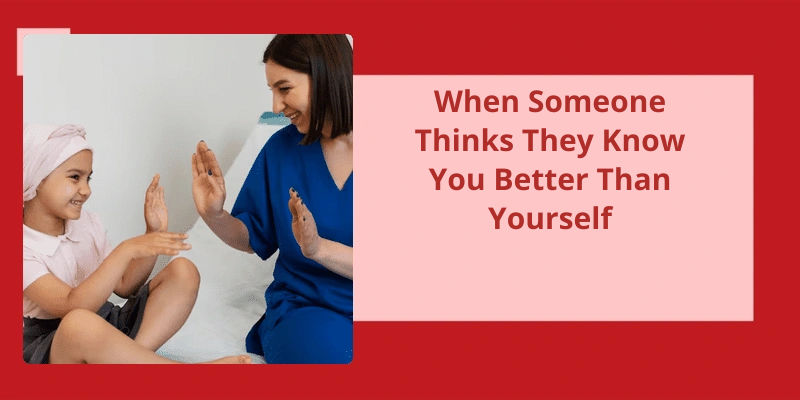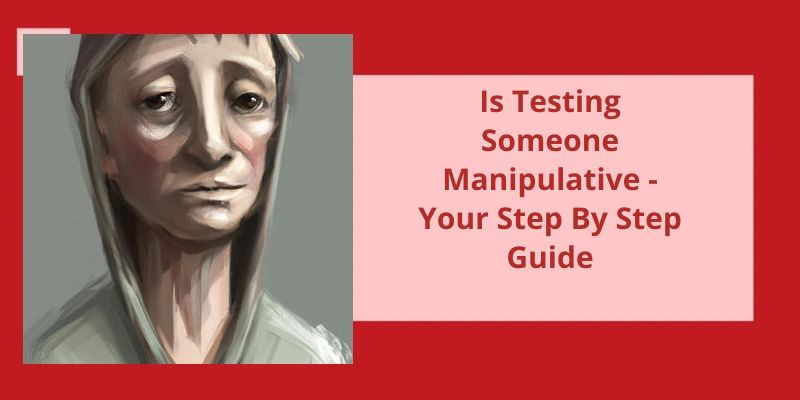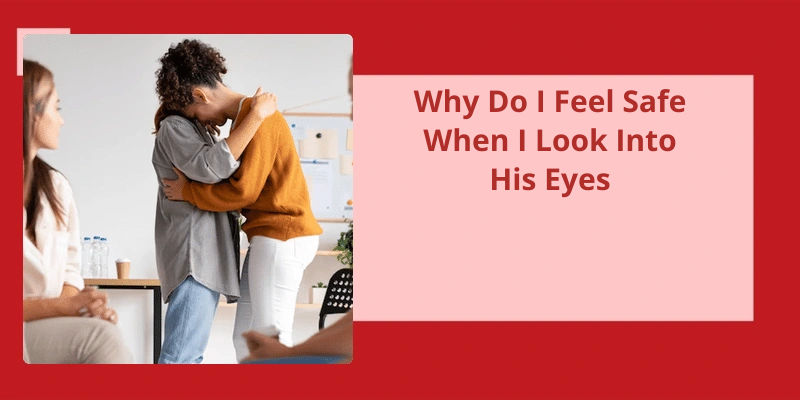It’s a common experience to encounter someone who thinks they know you better than you know yourself. This can be a frustrating and demoralizing experience, as no one should have the right to make assumptions about your character, personality, or life experiences. Often, these individuals may base their opinions on limited information or preconceived biases, leading to a warped and inaccurate depiction of who you truly are. Despite the frustration, it’s important to remember that no one can truly know you better than yourself. Only you’ve lived your life and experienced your thoughts, emotions, and actions. It’s crucial to stay true to yourself and not allow others to define who you are.
Do People Know Me Better Than I Know Myself?
However, the study found that when it comes to accurately assessing our own personalities, our friends and family may actually hold the upper hand. Researchers asked participants to complete personality assessments and also had their friends and family members complete assessments about their personalities. They found that the assessments completed by others were more accurate and reliable than the assessments completed by the participants themselves.
One possible explanation for this finding is the concept of self-deception. We all have biases and blind spots when it comes to assessing our own personalities. We may be more likely to give ourselves the benefit of the doubt or overlook negative traits, whereas our friends and family members may have a more objective perspective.
It’s also important to note that our friends and family members may have a unique perspective on our personality that we don’t possess. For example, they may have observed us in a variety of social situations or seen how we interact with different types of people. They may also have a better understanding of our behaviors and motivations based on their personal relationships with us.
Of course, it’s not entirely accurate to say that our friends and family members know us better than we know ourselves. After all, we’re the only ones who truly know our own thoughts, feelings, and experiences. However, it does suggest that our loved ones may be able to provide valuable insight into our personalities and help us see ourselves in a new light.
Overall, this study highlights the importance of seeking feedback and input from others when it comes to understanding our own personality. By doing so, we can gain a more accurate and nuanced understanding of ourselves and work towards personal growth and development.
The Role of Self-Esteem in the Accuracy of Self-Assessment
- Self-esteem can affect how accurately we perceive ourselves and our abilities.
- Individuals with higher self-esteem may overestimate their abilities and strengths.
- Individuals with lower self-esteem may underestimate their abilities and strengths.
- It’s important to have a balanced and realistic view of ourselves in order to accurately assess our strengths and weaknesses.
- Working on improving self-esteem can lead to more accurate self-assessment.
However, there can be situations where someone genuinely believes that you’re better than them in certain aspects. This can arise from admiration, insecurity, or a sincere assessment of your skills and abilities. In this article, we will explore what it means when someone thinks you’re better than them, the reasons behind this perception, and how you can handle it gracefully.
What Does It Mean When Someone Thinks You’re Better Than Them?
When someone thinks youre better than them, it can also be interpreted as a form of admiration or respect. Perhaps the person sees qualities in you that they aspire to have or recognizes your accomplishments. However, this can also lead to feelings of insecurity and inadequacy on their part if they compare themselves to you too much.
One possible reason someone might think youre better than them is if you display confidence and assertiveness. These qualities can be attractive to others and seen as signs of leadership or competency. However, it’s important to be mindful of how you present yourself so that it doesn’t come across as arrogance or condescension towards others.
Another explanation could be that the person has a low self-esteem or lacks confidence in their abilities. They may feel like they aren’t good enough, and seeing someone who they perceive as better only reinforces those feelings. It’s important to be supportive and empathetic towards them, rather than dismissive or judgmental.
Sometimes, thinking someone is better than you can also stem from societal or cultural beliefs about certain groups being superior or inferior. For example, if someone has been taught to think that men are better leaders than women, they may feel inferior when working with a competent female peer. It’s important to challenge and reject these biases and foster a more inclusive and equal environment.
Ultimately, it’s important to recognize that everyone has different strengths and weaknesses, and it’s not a competition or a comparison. Instead of focusing on who’s better, it’s more productive to cultivate a collaborative and supportive mindset where everyone can contribute their unique skills and perspectives for the benefit of the team or community.
However, this egocentric thinking can also manifest in other ways, such as an inflated sense of entitlement, feelings of superiority, and a belief that they’re more deserving of success and recognition. Let’s explore some of the underlying factors that contribute to this phenomenon and how it can affect individuals and those around them.
Why Some People Think They Are Better Than Others?
This may be due to a variety of factors, such as upbringing, social status, achievement, and personality traits. For example, if someone comes from a wealthy family, they may believe that their social status makes them better than others. Alternatively, if someone has achieved a great deal in their career, they may feel superior to those who haven’t achieved as much.
Additionally, cultural and societal influences may also contribute to why some people believe they’re better than others. In some cultures, there’s a strong emphasis on individualism and competition, which can lead individuals to focus on their own achievements and overlook the achievements of others. Furthermore, societal norms and expectations can create a sense of superiority among certain groups, such as those who hold privileged positions in society.
Personality traits such as narcissism and psychopathy can also contribute to why some people think they’re better than others. Narcissistic individuals have an inflated sense of self-importance, and often believe that they’re superior to others. Similarly, individuals with psychopathic traits may lack empathy and view others as merely pawns to be used for their own benefit.
Ultimately, it’s important to strive for humility and respect towards others, regardless of any perceived differences.
Source: Why do some people think they’re superior than others? …
Self-awareness is a crucial aspect of personal growth and development, as it allows individuals to identify their strengths and weaknesses, recognize areas for improvement, and make positive changes in their lives. It involves introspection and self-reflection, which can be difficult but ultimately rewarding. By gaining a deeper understanding of themselves, individuals can improve their relationships with others, make better decisions, and lead a more fulfilling life.
What Is the Ability of Someone to Know Themselves?
Knowing oneself is a critical aspect of personal growth, and it enables individuals to make conscious decisions about their lives. The ability to identify ones strengths and weaknesses, beliefs, values, and emotions is the foundation of self-awareness. It requires self-reflection and analysis, both of which can be challenging to develop, but with practice, it can be honed to perfection.
Self-awareness is particularly crucial for individuals in leadership positions, including CEOs, managers, and team leaders. It allows them to make informed decisions that are aligned with their values, communicate effectively, and inspire others. For teams, a self-aware leader creates a culture of openness, transparency, and honesty, which contributes to better teamwork and productivity.
Self-awareness isn’t a fixed trait but a skill that can be learned and developed over time. It requires a willingness to embrace discomfort, seek feedback, and challenge assumptions actively. Practices such as mindfulness, meditation, peer coaching, or journaling can help individuals cultivate self-awareness and improve their ability to navigate the complexities of their internal and external realities.
It’s crucial for personal growth and development, emotional intelligence, and effective leadership. While it may be challenging to develop, with practice, it can be honed to perfection and bring many benefits to individuals and teams.
The Benefits of Self-Awareness in Personal Relationships: How Being Self-Aware Can Improve Communication, Empathy, and Understanding in Romantic, Family, and Friend Relationships.
This article discusses the advantages of self-awareness in personal relationships such as romantic, family, and friend relationships. By being self-aware, individuals can improve communication, empathy, and understanding in their relationships.
Truly knowing oneself is a journey that requires self-reflection, introspection, and a willingness to delve deep within. It’s an ongoing process of unraveling layers and discovering the complexities of our own being. But how do you know if you’ve truly reached a state of self-awareness? Let’s explore some ways to evaluate whether you really know yourself.
How Do You Know if You Really Know Yourself?
At it’s simplest level, knowing oneself is about being aware of ones own identity, values, and goals. This requires introspection, reflection, and self-awareness, and can often involve complex emotions and thoughts. To truly know oneself, one must take an honest, objective look at their own experiences, relationships, patterns of behavior, and beliefs.
For some, self-exploration may be a lifelong journey of growth and discovery. It may involve seeking out new experiences, confronting difficult truths, and finding deeper meaning in life. It can also involve challenging ones own assumptions and beliefs, and being open and receptive to feedback and criticism from others.
However, even those who believe they know themselves well may still have blind spots or areas of ignorance they’re unaware of. This is particularly true in cases where individuals have experienced trauma or significant life changes, which can alter ones values, beliefs, and priorities.
It involves accepting both the good and bad parts of oneself, and being able to recognize ones limitations, flaws, and areas for improvement.
Some ways to work towards deeper self-awareness include journaling, mindfulness practices, seeking feedback from trusted friends and family members, and engaging in therapy or counseling. Taking time for self-reflection and introspection, setting personal goals and priorities, and being intentional about ones choices and actions can also be helpful in developing a stronger sense of self-awareness.
The Role of Personality Traits in Self-Knowledge
This topic explores how different personality traits can affect an individual’s self-knowledge and understanding of their own thoughts, feelings, and behaviors. It highlights the importance of recognizing these traits in order to better understand oneself and make informed decisions in life.
Conclusion
In conclusion, there’s no denying the fact that there will always be people who think they know us better than we know ourselves. It could be family members, friends or colleagues; however, it’s important to always remember that we’re the only ones who truly know who we’re and what we want. No one else can fully understand the complexities of our thoughts and experiences. It’s through introspection, reflection, and personal growth that we come to understand ourselves better. So, let’s not be deterred by the opinions of others who may think they know us better than ourselves, and instead embrace the journey of self-discovery and self-awareness. It’s only through this process that we can truly achieve fulfillment and happiness in our lives.






